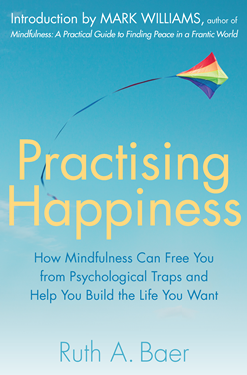What is mindfulness?
Mindfulness is a way of paying attention to the present moment. In any given moment, we have many choices about where to focus our attention. The inner world is full of thoughts and feelings. The outer world is full of sights, sounds, and scents. When we’re mindful, we observe them with a nonjudgmental, interested, friendly, and compassionate attitude.
Mindfulness was originally discussed in ancient Buddhist teachings, and you can learn a lot about mindfulness by studying the Buddhist traditions and practices. In the fields of psychology and mental health, we’re interested in how mindfulness skills and exercises can benefit everyone, regardless of their religious background or beliefs. This book describes a completely secular, non-religious approach to mindfulness.
Mindfulness can be developed by practising skills that are explained in this book: observing, labelling nonjudgmentally, acting with awareness, accepting the reality of the present moment, and self-compassion. As you work your way through the book, be sure to do the worksheets and practise the exercises. Reading about mindfulness is helpful and interesting, but it’s impossible to truly understand mindfulness or get the benefits without practising it.
What are the benefits of practising mindfulness?
Mindfulness has many benefits. Research shows that it helps people with stress, depression, anxiety, eating problems, and alcohol and drug problems. It reduces chronic pain, insomnia, and the stress of having illnesses, such as cancer. It improves aspects of attention, memory, and brain function. It can lower blood pressure and strengthen the immune system. People who practise mindfulness are better able to stay in touch with their true priorities and act in accordance with them, even during difficult times. Their relationships with others are stronger and more satisfying.
How does practising mindfulness accomplish all of this? It cultivates positive emotions and puts us in touch with sources of happiness in everyday life. It also helps us avoid common but unhelpful ways of thinking and reacting. When we’re being mindful, we can manage stress and difficulties in healthy ways, without getting trapped in downward spirals that lead to depression, anxiety, and behavior we regret. Mindfulness provides time to choose wisely what to do in upsetting situations. This leads to a greater sense of meaning, satisfaction, and well-being.
Important points to understand about mindfulness
- Mindfulness is not about stopping your thoughts, emptying your mind, or numbing your feelings. It will help you develop insight and clarity about your thoughts and feelings, so that you can make wiser decisions about what to do in difficult situations.
- Mindfulness can seem paradoxical and puzzling at first. This is normal. If you work your way through this book with an open-minded attitude, the nature of mindfulness and how it can help you will become clearer, especially if you do the worksheets and exercises.
- It’s impossible to understand mindfulness without practising it. Just reading about it won’t have lasting benefits. Neither will practising just once or twice. As best you can, incorporate mindfulness into your daily life in an ongoing way. This does not have to take a lot of time. In fact, mindfulness will help you see clearly how you’re using your time. You may end up with more time.
- Mindfulness will not make you passive, slow, or zoned out. It will help you see clearly what’s actually happening in any situation. You’ll be better able to choose – with awareness and wisdom – what you want to focus on and what you want to do about it, in a way that’s consistent with your deepest values and most important goals in life.
- Mindfulness will not make you selfish or self-absorbed. It will help you see more clearly how you’re relating to others. You’ll find it easier to be truly present with people and aware of their feelings and perspectives as well as your own.
